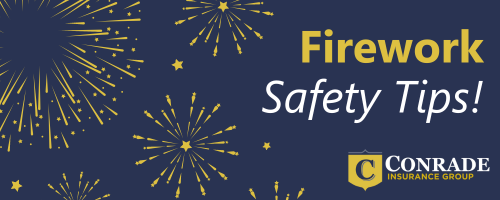Fireworks can add a splash of color and excitement to any celebration, but they also come with risks like burns and injuries, fire outbreaks, and harm to pets. Here are some facts about firework safety from the National Fire Protection Association:
- Fireworks start around 19,500 fires annually.
- Most firework injuries are to the eyes, hands, fingers, or legs.
- Children ages 10 to 14 have the highest rate of firework injuries.
- Sparklers cause 25% of injuries leading to emergency room visits.
Safety should be the guiding principle as you plan your home fireworks displays. Taking a few simple precautions can prevent accidents and make celebrations memorable for all the right reasons.
Make sure fireworks are legal
Before purchasing or using fireworks, ensure they’re legal in your area. Check local ordinances and state laws, too. Even if fireworks are legal in your state, they might be banned in your community. If you choose to use fireworks, follow safety recommendations from the Department of Homeland Security:
Purchase fireworks from reliable sources
Buy your fireworks from licensed and reputable shops or dealers. This will help ensure you’re getting products that meet safety standards. Only buy ones that are rated for home use.
Keep a safe distance
Designate a clear, flat area away from buildings, vehicles, pets, kids, and flammable materials for the firework launch area. If you’re using ground-based fireworks (like a fountain), keep spectators at least 35 feet away. For aerial fireworks, keep spectators 150 feet away from the launch.
Igniting fireworks
Never allow children to handle or light fireworks.
Keep fireworks on the ground and away from people and animals. Use a stem lighter such as a grill lighter. Ignite fireworks one at a time. Never place a part of your body directly over a firework or hold a firework in your hand while lighting it.
Check for wildfire risk in your area
Obey red flag warnings in your area. The National Weather Service issues red flag warnings when there is an elevated risk for wildfires, like low rainfall and windy conditions. If you’re unsure of the risk, don’t chance it. It only takes one spark to start a blaze.
Douse fireworks that don’t explode
If a firework doesn’t ignite successfully, douse it with water and discard it. Let it sit for 10 minutes to avoid a delayed explosion. Then put it in a water bucket. Never look into the firework to inspect why it didn’t go off. You could be severely injured or killed.
Safety equipment and apparel
Use fireworks outside and have buckets of water or a hose connected to an open water source nearby. Wear safety goggles and nonflammable clothing. Avoid loose apparel that can catch fire easily.
Avoid alcohol when using fireworks
Alcohol and fireworks are a dangerous combination. Only operate fireworks when you’re sober.
Keep pets away from fireworks
Fireworks can be stressful for pets. They don’t understand the noise and lights are for fun. They might panic and try to escape. As a result, your display or spectators could be harmed. Keep your pets indoors when shooting off fireworks. Close the windows and draw the curtains to reduce noise and visuals. Turn on the TV or radio to help relax them. Maintain a safe space, ensuring they have access to their favorite toys, bedding, and treats.
Your home insurance may not cover firework accidents
Your home insurance policy may not cover a firework-related incident, including fires and medical liability to others. This is especially true if you cause injury or damage where fireworks are illegal. You risk legal penalties and fines. Talk to a Conrade insurance consultant to make sure you are covered in case of firework damage before Independence Day.

